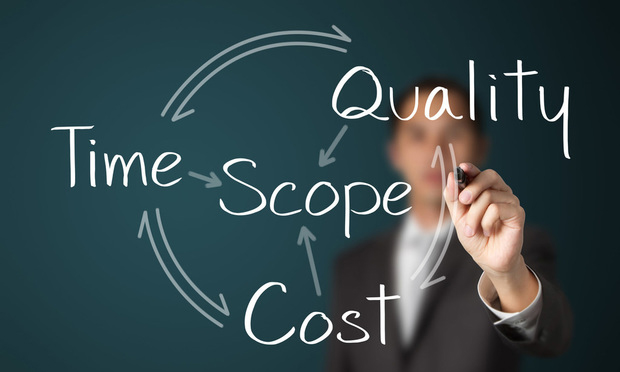The Legal Industry's Scoping Problem
The legal industry needs to move past thinking about pricing and start thinking more about scoping their matters, writer Keith Lipman argues.
January 17, 2018 at 08:28 PM
8 minute read

We are constantly writing about the change that is occurring in the legal industry. We hear the drumbeat of “innovate,” but with so much writ of late and so little said, it is becoming difficult to not treat the word “innovate” with disdainful irony. Without cognition of the core problem, innovate becomes meaningless. We are in a scoping crisis.
I previously argued disruption of the legal industry stemmed from the addition of “expected price” to our definition of client-value: “deliver quality matters” became “deliver quality matters at the expected price,” and changed everything. It is understandable that our first reaction was to infer we were in a pricing crisis, and then set about building pricing groups and developing those skills to our current sophistication. But pricing alone is insufficient as scoping is inextricable to it—and lawyers don't scope.
It is almost too obvious to state that in all professional services industries, everyone is accustomed to the core principal that projects are delivered to plan. From the moment one arrives as a newly hired college graduate, one is schooled in the idea that if the unit of work or activity does not appear in the project plan, it is not to be done. If the client asks for something that is not in the project plan, the trained response is to tell the project manager or relationship manager who will provide a change order for the client to cover the additional activity.
This is called scope. Scope is the bedrock of client relationships. Clients want certainty; this is the client theory of “no surprises:” yes, clients are demanding budgets to control cost—but it's not solely cost at issue. It's the need for certainty, the desire for no surprises in their legal spend.
Without scope, when partners price matters, they are giving educated guesses. Guessing is not a long term strategy, it doesn't scale well, and when the guess goes wrong, it's rather difficult to justify the error—so we save face and the relationship by writing off the error. That is why we, the legal industry, are in a scoping crisis.
Learning to scope is a better strategy than guessing—in fact, it delivers the missing ingredient on clients' theory of no surprises, which is important for firms endeavoring to develop strong, long-term relationships.
Eating Bad Scope for Lunch
Lawyers are trained to provide the best legal result, no matter the cost, period. In the old world of client-value, this worked very well for all parties. Under the clients' theory of no surprises, not so much.
Let's disabuse ourselves of the fantasy that the billable hour will ever return to its former glory. Large clients, including the likes of GlaxoSmithKline and Microsoft, are making strong statements regarding moving all work away from the billable hour model—and setting the example for all those that will surely follow. More and more as time goes on, it is simply the case that partners that cannot scope will be eating that bad scope for lunch by writing off work.
Scoping can be learned. Anecdotally, about 1 to 2 percent of partners are preparing detailed hours-based budgets while the rest are quoting an amount and typically getting it wrong. Often, partners look to use what they think are similar prior matters to plan new matters; however, it is difficult to understand what drivers determined the matter's price. This is a start, but imperfect. We need to operationalize scoping skills.
Getting to Effective Scope Management
Management of scope is difficult for three reasons: (1) lack of language to describe scope (2) lack of data, and (3) lack of partner training. If we address these three problems, law firms will understand unit cost of services, enabling overtime the clients' theory of no surprises. Even better, out of scope work discussions—which will happen of course—are recomposed as ROI discussions: the value of the unit of service versus the cost of the unit of service. If the client sees the value, then a change in scope for the cost of the unit is executed with simplicity, like any statement of work change order. Here's a breakdown of how we get there.
1. Develop Scoping Language Partners will always complain that every matter is different. This truism is generally factual; however, the units or processes within the service are the same and repetitive. The reality is that lawyers predominantly provide four types of services: (1) advice, (2) transactions, (3) litigation/adversarial and (4) regulatory. Except for advice, the other 3 types work well for development of clear scoping language.
The development of scoping language is composed of two elements: (1) the definition of the activity (e.g. draft motion to compel, draft asset purchase agreement, etc.) and (2) the scale of the activity (e.g. small, medium, large, etc.). Each element of scope could also have an associated checklist of sub-steps that need to be taken.
There are good starting points already available in the industry to start developing scoping language:
- For litigation, courts or tribunals rules of procedure
- For transactions, the work of the LPM Task Force of the M&A Committee of the ABA Business Law Section
- For patent prosecution, CLOC's “Patent Prosecution Deliverable Framework”
2. Lack of Data The best solution is to marry time entries to task management. In this way, users can enter time against tasks rather than matters and capture the work around a specific activity instead of a phase of work. To do this, users need the ability to easily enter time against a planned task/unit of work. The advantage of this approach is that the correct task code can be auto-selected, the narrative can be defaulted—and partners come to understand the cost of delivering each unit of work.
Time entry data—as it stands today—is rather poor. Even if it were great, using just time entries leaves a process gap—there would be no prompting when scope is about to be violated, e.g. if the statement of work stipulated four depositions but the partner is initiating the fifth.
Task codes also present challenges. While many clients require the use of the Uniform Task-Based Management System task codes, this data has not been very valuable. The accuracy in selecting the right task code is relatively low and clients are generally not auditing the selection. There is also ambiguity in many of the task code standards and too many codes.
The other challenge is that task codes only describe phases of work. If a lawyer files four motions to compel, if everything was coded correctly, the partner would only know the total effort for all four motions but that is all—and no one would know from the time entries that there were four motions. The technology for time entry needs to change.
3. Partner Training Change is hard and lawyers in particular do not do well with it. They are particularly averse to the blank page and will require evidence any change will directly and positively impact their relationships. So, get in the evidence-creating business, otherwise known as a pilot.
Start with a coalition of the willing. There always exists those partners who enjoy being on the edge, or are who already feeling the impact, or whose clients are already driving the need for scoping skills. Find them and start. Start slow. Roll out early and small successes of your pilot and let natural competitiveness create the movement you need internally. For, while it is true lawyers do not care for the blank page, the other truism of lawyers is their intensely competitive natures.
It will not take a mountain of evidence to inspire others to follow. Allow the process of rolling out successes and gaining new followers to take shape as a block and tackle endeavor. Keep moving forward. Some partners will prefer to customize their list of scoping elements to fit their unique approach. This provides them the ability to buy in. The ability to understand the unit cost of each task will empower them to provide better client service—and the firm, one day, to offer their clients menu pricing. And menu pricing is truly innovative.
 Keith Lipman is the CEO and co-founder of Prosperoware, a known thought leader regarding the transformation of the practice of law, and frequent speaker and author on this topic. Keith is one of the founding board members of the Standards Advancement of the Legal Industry (SALI) and has served in a number of professional capacities including paralegal, lawyer, IT director and technology consultant to law firms. Keith earned his BA, JD, and MBA from Temple University.
Keith Lipman is the CEO and co-founder of Prosperoware, a known thought leader regarding the transformation of the practice of law, and frequent speaker and author on this topic. Keith is one of the founding board members of the Standards Advancement of the Legal Industry (SALI) and has served in a number of professional capacities including paralegal, lawyer, IT director and technology consultant to law firms. Keith earned his BA, JD, and MBA from Temple University.
This content has been archived. It is available through our partners, LexisNexis® and Bloomberg Law.
To view this content, please continue to their sites.
Not a Lexis Subscriber?
Subscribe Now
Not a Bloomberg Law Subscriber?
Subscribe Now
NOT FOR REPRINT
© 2025 ALM Global, LLC, All Rights Reserved. Request academic re-use from www.copyright.com. All other uses, submit a request to [email protected]. For more information visit Asset & Logo Licensing.
You Might Like
View All

Strategic Pricing: Setting the Billable Hour at the Intersection of Psychology, Feedback and Growth


'Rethink Everything' or 'Optimize What's Working'? The Right Law Firm Strategy
7 minute readTrending Stories
- 1We the People?
- 2New York-Based Skadden Team Joins White & Case Group in Mexico City for Citigroup Demerger
- 3No Two Wildfires Alike: Lawyers Take Different Legal Strategies in California
- 4Poop-Themed Dog Toy OK as Parody, but Still Tarnished Jack Daniel’s Brand, Court Says
- 5Meet the New President of NY's Association of Trial Court Jurists
Who Got The Work
J. Brugh Lower of Gibbons has entered an appearance for industrial equipment supplier Devco Corporation in a pending trademark infringement lawsuit. The suit, accusing the defendant of selling knock-off Graco products, was filed Dec. 18 in New Jersey District Court by Rivkin Radler on behalf of Graco Inc. and Graco Minnesota. The case, assigned to U.S. District Judge Zahid N. Quraishi, is 3:24-cv-11294, Graco Inc. et al v. Devco Corporation.
Who Got The Work
Rebecca Maller-Stein and Kent A. Yalowitz of Arnold & Porter Kaye Scholer have entered their appearances for Hanaco Venture Capital and its executives, Lior Prosor and David Frankel, in a pending securities lawsuit. The action, filed on Dec. 24 in New York Southern District Court by Zell, Aron & Co. on behalf of Goldeneye Advisors, accuses the defendants of negligently and fraudulently managing the plaintiff's $1 million investment. The case, assigned to U.S. District Judge Vernon S. Broderick, is 1:24-cv-09918, Goldeneye Advisors, LLC v. Hanaco Venture Capital, Ltd. et al.
Who Got The Work
Attorneys from A&O Shearman has stepped in as defense counsel for Toronto-Dominion Bank and other defendants in a pending securities class action. The suit, filed Dec. 11 in New York Southern District Court by Bleichmar Fonti & Auld, accuses the defendants of concealing the bank's 'pervasive' deficiencies in regards to its compliance with the Bank Secrecy Act and the quality of its anti-money laundering controls. The case, assigned to U.S. District Judge Arun Subramanian, is 1:24-cv-09445, Gonzalez v. The Toronto-Dominion Bank et al.
Who Got The Work
Crown Castle International, a Pennsylvania company providing shared communications infrastructure, has turned to Luke D. Wolf of Gordon Rees Scully Mansukhani to fend off a pending breach-of-contract lawsuit. The court action, filed Nov. 25 in Michigan Eastern District Court by Hooper Hathaway PC on behalf of The Town Residences LLC, accuses Crown Castle of failing to transfer approximately $30,000 in utility payments from T-Mobile in breach of a roof-top lease and assignment agreement. The case, assigned to U.S. District Judge Susan K. Declercq, is 2:24-cv-13131, The Town Residences LLC v. T-Mobile US, Inc. et al.
Who Got The Work
Wilfred P. Coronato and Daniel M. Schwartz of McCarter & English have stepped in as defense counsel to Electrolux Home Products Inc. in a pending product liability lawsuit. The court action, filed Nov. 26 in New York Eastern District Court by Poulos Lopiccolo PC and Nagel Rice LLP on behalf of David Stern, alleges that the defendant's refrigerators’ drawers and shelving repeatedly break and fall apart within months after purchase. The case, assigned to U.S. District Judge Joan M. Azrack, is 2:24-cv-08204, Stern v. Electrolux Home Products, Inc.
Featured Firms
Law Offices of Gary Martin Hays & Associates, P.C.
(470) 294-1674
Law Offices of Mark E. Salomone
(857) 444-6468
Smith & Hassler
(713) 739-1250










